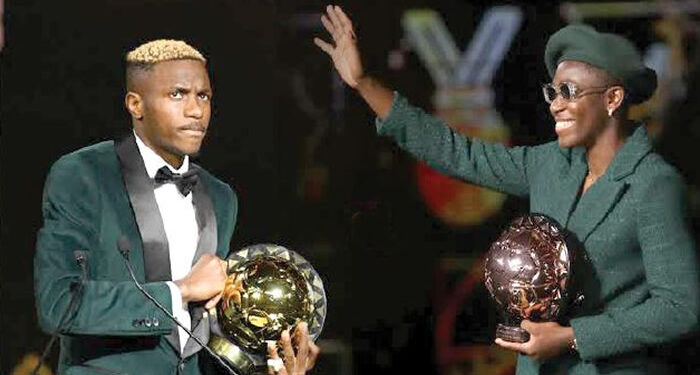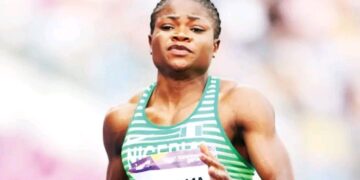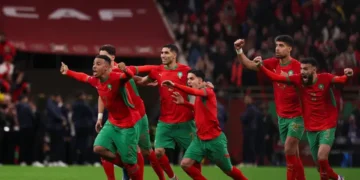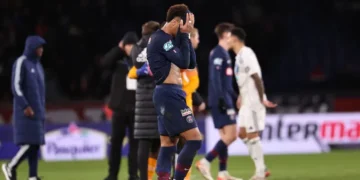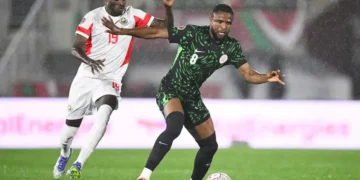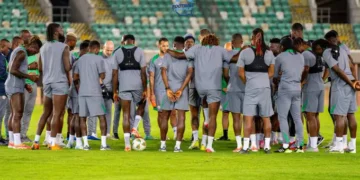As Nigeria celebrates its 64th Independence Day, it is an opportune moment to reflect on the past year in sports, a field that has historically played a significant role in the nation’s identity. From remarkable achievements that inspire national pride to setbacks that highlight ongoing challenges, the last 365 days have been a rollercoaster for Nigerian sports.
Nigerians have been participating in international sports since before the nation gained independence in 1960. Over the past six decades, the sports landscape in Nigeria has expanded significantly, marked by both memorable triumphs and unfortunate disappointments. Each year adds to the rich tapestry of Nigeria’s sporting history, and the past year has been no exception.
One of the standout moments of the year occurred just before the Independence Day celebrations, as Nigeria’s U-19 women’s cricket team, affectionately known as the Junior Yellow Greens, secured a spot in the Cricket World Cup. Competing in Rwanda, the team showcased exemplary performance throughout the qualifiers, finishing on top of their group. Although their final match against Zimbabwe was interrupted by rain, their overall record, including a thrilling one-wicket victory against the same team, affirmed their dominance in the tournament. This achievement marks Nigeria’s second qualification for a cricket World Cup, following the men’s U-19 team’s success in 2019.

Another source of national pride emerged from the Paris 2024 Paralympics, where Team Nigeria earned seven medals, despite this being considered one of their less successful outings. Notably, para-powerlifter Folashade Oluwafemiayo made history by breaking the world record in her category, lifting an astounding 166 kg to clinch gold. Additionally, Bolaji Eniola’s achievement as the first African to medal in badminton at the Olympics or Paralympics further brightened Nigeria’s sporting profile. The team’s overall haul included two gold, three silver, and two bronze medals, exemplifying the athletes’ resilience and dedication
In a significant milestone for Nigerian boxing, Elizabeth Oshoba became the first female Nigerian boxer to capture a world title. On January 13, she achieved this feat by defeating Italy’s Michela Braga in a dramatic bout in Copenhagen, Denmark, thus earning the WBC silver featherweight championship. Oshoba’s victory not only solidified her status in the sport but also marked a pivotal moment for female athletes in Nigeria
Atalanta forward Ademola Lookman further captured the hearts of Nigerian fans during the 2023 Africa Cup of Nations (AFCON) in Ivory Coast, where he helped secure a silver medal for the Super Eagles. His contributions extended to the club level, where he played a pivotal role in Atalanta’s historic 3-0 victory over Bayer Leverkusen in the Europa League final, scoring a hat-trick. Lookman’s impressive tally of 16 goals and nine assists across all competitions this season underscores his burgeoning talent and potential.
The year also saw a historic moment in Nigerian football, as Victor Osimhen and Asisat Oshoala were crowned the African Player of the Year for men and women, respectively, at a ceremony in Marrakesh, Morocco. This marked the first time since 1999 that Nigeria had winners in both categories in the same year. Osimhen ended a 24-year wait for the men’s accolade, while Oshoala extended her record to six wins, reinforcing Nigeria’s reputation as a powerhouse in African football
The Super Eagles’ journey in the AFCON earlier this year culminated in a silver medal, following a hard-fought final against the hosts, Ivory Coast, where they lost 2-1. This marked the fifth time Nigeria has finished as runners-up in the tournament. Defender William Troost-Ekong’s standout performances earned him the Player of the Tournament award, further highlighting the team’s potential on the continental stag
On the flip side, the year was not without its disappointments. Nigeria’s performance at the Paris 2024 Olympics was disheartening, with the nation’s 88-member contingent failing to secure any medals. This marked the eighth occasion that Nigeria returned from the Olympics empty-handed, raising serious concerns about the state of sports administration and athlete preparation in the country
The Olympics also brought to light serious issues regarding athlete selection and management. Sprinter Favour Ofili expressed her dismay at being omitted from the women’s 100m event despite qualifying. This incident followed her previous exclusion from the Tokyo 2020 Games due to missed pre-competition tests. In response, the Minister of Sports Development, John Enoh, has initiated an investigative committee to address the reasons behind Ofili’s exclusion and other related matters.
At 64, Nigeria faces a stark reality regarding its sports infrastructure. The Godswill Akpabio Stadium in Uyo remains the only venue approved by the Confederation of African Football (CAF) to host matches. Meanwhile, other facilities, including the National Stadium in Surulere, have fallen into disrepair. This decline is concerning, especially considering Nigeria’s previous hosting of major FIFA tournament
Nigeria, once a dominant force in youth football with five FIFA U-17 World Cup titles, failed to qualify for the 2023 and 2025 editions. The Golden Eaglets, who have historically produced exceptional talent, were unable to secure a spot after a disappointing performance at the WAFU B tournament. The Nigerian Football Federation’s miscommunication regarding their qualification status further compounded the situation.
The specter of doping continues to haunt Nigerian athletics, with several high-profile athletes facing bans for violations. Sprinter Divine Oduduru received a six-year ban for multiple anti-doping rule violations, while boxer Cynthia Ogunsemilore was provisionally suspended after testing positive for a banned substance prior to the Olympics. These incidents highlight the ongoing challenges in maintaining integrity within the sport
As Nigeria reflects on its 64 years of independence, the highs and lows of the past year in sports serve as a microcosm of the nation’s broader journey. While there are significant achievements to celebrate, the setbacks remind us of the work that remains to be done in nurturing talent, maintaining infrastructure, and ensuring fair practices. The future of Nigerian sports holds promise, but it requires collective effort and commitment from all stakeholders involved.
Post Views: 800



